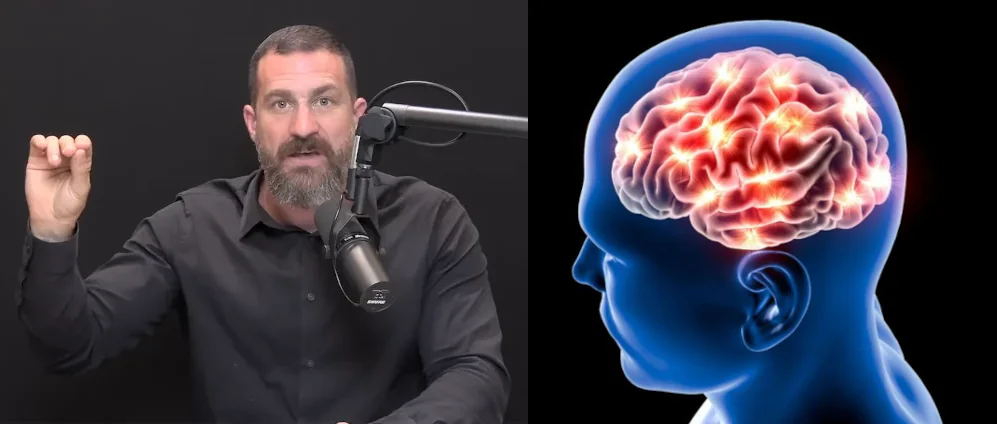In this post we’ll look at the supplements Andrew Huberman has suggested for improving sleep:
| Supplement | Dose / Notes |
|---|---|
| Magnesium L-Threonate | 140 mg nightly |
| Theanine | 100 – 300 mg nightly |
| Apigenin | 50 mg nightly |
| Inositol | 900 mg nightly |
He takes the above around 1 hour prior to bed.
Then, 3 to 4 nights per week, if he’s having difficulty sleeping, he also takes the below:
Below we’ll look at these in more detail…

Whilst Andrew hopes that most people will fall asleep without assistance.
For those who don’t, he suggests there is a middle ground between taking nothing and taking sleeping pills.
The combination that works for him and many others are Magnesium, Theanine and Apigenin – which he discusses in the clip below:
^ A clip from Episode 28 of Andrew’s podcast
Combo 1 – Magnesium, Theanine & Apigenin, Inositol
Magnesium Threonate
Magnesium is very important to the human body, and is involved in over 600 enzymatic reactions1Magnesium in man: implications for health and disease – Bindels et al. | 2015 | Physiological Reviews.
Specific to sleep, magnesium supplementation can activate the parasympathetic nervous system2Long-term HRV analysis shows stress reduction by magnesium intake – Nolden et al. | RCT, n=100 | 2016 | MMW – Fortschritte der Medizin, which is responsible for, among other things, slowing the heart and relaxing the muscles – producing a calming effect.
For those who aren’t getting adequate amounts of magnesium from their diets; supplementing it can have a noticeable affect on sleep.
Andrew personally prefers the Threonate form (also known as L-Threonate), but notes that Bisglycinate appears to work well too – as both can cross the blood-brain barrier.
In terms of suggested dosage for magnesium Andrew mentions:

My interpretation is that the dose is dependent upon the form of Magnesium. If it’s Magnesium Threonate, then less is suggested (~140 mg), whereas, with bis-glycinate, the standard dose is slightly higher (200 mg or more).
For context, the Recommended Dietary Allowance (RDA) of Magnesium is around 420 mg per day for men and 320 mg for women, according to the NIH.
Examples of reputable brands of L-Threonate include:
| Product | Servings | Price | Cost per 100 mg* |
| Momentous – L-Threonate | 30 x 144mg | $34 with coupon | $0.78 |
| NOW – L-Threonate | 30 x 144mg | $29 | $0.67 |
Magnesium Threonate is typically more expensive than other magnesium sources due to it being patented and sold as “Magtein” – more info.

Andrew’s Dose: ~140mg of L-Threonate
Magnesium Glycinate is another good source of magnesium that is noticeably more affordable (see cost per 100 mg). Reputable brands include:
| Product | Capsules | Price | Cost per 100 mg* |
| Double Wood – Magnesium Glycinate | 180 x 60 mg | $17 with coupon | $0.15 |
| NOW – Magnesium Glycinate | 180 x 200 mg | $18 | $0.05 |

Theanine
Theanine, which is an amino acid found in tea, can have calming effects when supplemented3Theanine consumption, stress and anxiety in human clinical trials: A systematic review – Naumovski | Meta-review | 2016 | Journal of Nutrition & Intermediary Metabolism..
One of the ways it does this is to increase “alpha brain waves” – a type of brain wave that is associated with calm and relaxation4L-theanine, a natural constituent in tea, and its effect on mental state – Owen et al. | 2008 |Asia Pacific Journal of Clinical Nutrition.
As opposed to Beta and Gamma brain waves – which are associated with alertness and problem solving.
Andrew notes that Theanine can increase the intensity of dreams, and thus may not be suitable for those with night terrors or who sleepwalk.
Again, as with Threonate above, Andrew has mentioned different doses at different times. For example, 100-300mg and 200-400mg. Granted it’s all in the same ball park. If you’re new to Theanine, it’s probably best to start at the bottom end of the dosing scale (~100mg) and gradually increase as you see fit.
Andrew notes that for a small percentage of people, Theanine can be too stimulating:

^ Image source
Examples of reputable brands include:
| Product | Capsules | Price | Cost per 100mg |
| NOW – Theanine | 120 x 200mg | $20 | $0.08 |
| Momentous – Theanine | 60 x 200mg | $33 with coupon | /$0.28 |

Huberman’s Dose: 100 – 300 mg
Apigenin
Apigenin is one of the active ingredients in chamomile tea, and according to Andrew can help promote sleep and sleep onset.
Andrew notes that apigenin is a mild estrogen suppressor, and he doesn’t think women should take it.
He also notes that for men, taking estrogen levels too low can affect brain health and libido.
Authors note: Based on apigenin suppressing estrogen, it appears to be a supplement you’d want to be cautious of taking regularly. At least until there’s more research.
Examples of brands include:
- Momentous – Apigenin – 50 mg – (see 15% off discount code)
- Double Wood – Apigenin – 50 mg – (see 15% off discount code)
Andrew’s Dose: 50mg

Inositol
In Andrew’s recent video on OCD, he mentions experimenting with taking 900 mg of myo-inositol alongside his sleep cocktail of magnesium threonate, theanine and apigenin.
Saying that he has noticed an improvement in his sleep since taking it.
^ Audio clip from Andrew’s podcast #78 on OCD from 2:04:51
Inositol is a type of sugar, found in the brain and other tissues, which mediates cell signal conversion in response to hormones, neurotransmitters and growth factors. When these external signals reach the cell they are converted into internal messengers, for which myo-inositol is involved5The cellular language of myo- inositol signaling – Glenda E. Gillaspy (2011).
To clear up some potential confusion on inositol naming, there are 3 common inositol supplements:
- Myo-inositol
- D-chiro-inositol
- Inositol hexaphosphate (IP6)
If a supplement is simply named “inositol”, it’s usually myo-inositol – but it’s worth checking to be sure.
Examples of brands include:
- Momentous – Inositol – 900 mg per capsule
- Life Extension – Inositol – 1,000 mg per capsule
- Jarrow Formulas – Inositol – 750 mg per capsule

Combo 2 – GABA & Glycine
Andrew says that if you ever really need to sleep, taking GABA and Glycine can help.
He describes it more as a “hard hit over the head”, and doesn’t recommend people take it regularly.
His reasoning being that he doesn’t like to take things that are too close to the neurotransmitter you’re trying to manipulate. In this case, taking GABA to manipulate the GABAergic system.
GABA (Gamma-aminobutyric acid) is the main inhibitory neurotransmittor in the brain.
When supplemented it’s often with the intention that it will have a calming effect on the nervous system. There is some debate as to whether GABA crosses the blood-brain barrier6Effects of Oral Gamma-Aminobutyric Acid (GABA) Administration on Stress and Sleep in Humans: A Systematic Review – Hepsomali et al. (2020) | Frontiers in Science. Whether it does or does not, it may also act on the peripheral nervous system through the gut-brain axis7Gamma-aminobutyric acid as a bioactive compound in foods: a review – Diana et al. (2014) | Journal of Functional Foods.
Glycine is a non-essential amino acid, abundant in animal products. It’s thought to improve sleep by helping to reduce the core body temperature8New Therapeutic Strategy for Amino Acid Medicine: Glycine Improves the Quality of Sleep – Bannai et al. (2012) | Journal of Pharmacological Sciences.
Dosage: In the audio clip above Andrew mentions 1g of GABA and 1g of Glycine. However, in Andrew’s toolkit for sleep and on Twitter he mentions 2g of Glycine and 100mg of GABA taken 3-4 times per week.
In his tweet he describes the Magnesium, Theanine & Apigenin combo, and then goes on to say he *also* takes GABA & Glycine 3-4 times per week. Which I take to mean, in addition, rather than in place of.
Side Effects: GABA can have sedative like effects at higher doses, therefore it’s important to treat it with caution. Do not combine it with driving a vehicle or operating machinery.
For those already taking drugs that interact with the GABAergic system, such as barbiturates and benzodiazepines, it would be especially important to consult with your doctor before taking GABA.
Examples of GABA brands include:
- Thorne – GABA – 100 mg capsules
- Double Wood – GABA – 500 mg capsules (see 15% off coupon code)

Examples of Glycine brands include:
- Life Extension – Glycine – 1,000 mg (1g) capsules
- Double Wood – Glycine – 500 mg capsules (see 15% off coupon code)
- NOW – Glycine – 1,000 mg (1g) capsules

Roundup

Above we looked at 2 different combinations of supplements you can use for improving sleep quality, without having to resort to sleeping pills.
It makes sense to start by looking at combo #1 – as it’s possible that the addition of just Magnesium and either Theanine or Apigenin will be enough.
Personally I don’t like to add a whole lot of supplements to my daily routine in one go. So I’d start by adding Magnesium (then understand the affect), add Theanine (again, understand affect), Apigenin then Inositol.
That way it’s easier to know if any of them do not agree with your body.
If those didn’t work for you, then it could be worth moving on to combo #2 – and experimenting with GABA & Glycine.
Hopefully the above helps. If you have any questions or comments, please leave them below.
Further Reading
If you found this post interesting, you may also like:
- Andrew Huberman’s Diet – What he eats and when – the formula that works for him
- – a full list of the supplements Huberman takes and discusses
- Andrew Huberman’s Book Recommendations – 21 books he has read, enjoyed and recommends
References
- 1Magnesium in man: implications for health and disease – Bindels et al. | 2015 | Physiological Reviews
- 2Long-term HRV analysis shows stress reduction by magnesium intake – Nolden et al. | RCT, n=100 | 2016 | MMW – Fortschritte der Medizin
- 3
- 4L-theanine, a natural constituent in tea, and its effect on mental state – Owen et al. | 2008 |Asia Pacific Journal of Clinical Nutrition
- 5The cellular language of myo- inositol signaling – Glenda E. Gillaspy (2011)
- 6Effects of Oral Gamma-Aminobutyric Acid (GABA) Administration on Stress and Sleep in Humans: A Systematic Review – Hepsomali et al. (2020) | Frontiers in Science
- 7Gamma-aminobutyric acid as a bioactive compound in foods: a review – Diana et al. (2014) | Journal of Functional Foods
- 8New Therapeutic Strategy for Amino Acid Medicine: Glycine Improves the Quality of Sleep – Bannai et al. (2012) | Journal of Pharmacological Sciences


